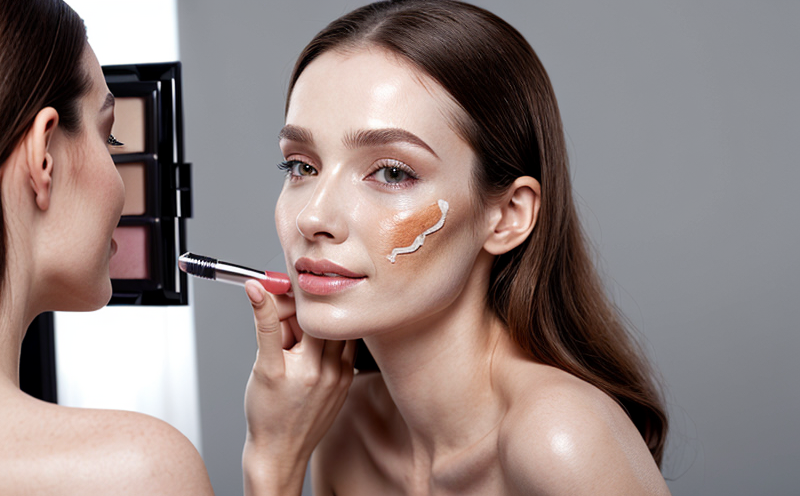Clinical Testing of Skin Barrier Function in Cosmetics
The clinical testing of skin barrier function is a critical aspect of ensuring the safety and efficacy of cosmetic products. The skin acts as an effective barrier, protecting the body from external environmental factors such as microorganisms, irritants, allergens, and excessive water loss. When this natural protective layer is compromised due to product use or other factors, it can lead to various skin conditions including irritation, eczema, and increased permeability.
This service involves a series of tests designed to assess the impact of cosmetic formulations on the integrity of the stratum corneum (SC), which plays a crucial role in maintaining the skin’s protective properties. The testing process is aimed at ensuring that new products do not cause adverse effects, are well-tolerated by the majority of consumers, and meet regulatory requirements for safe use.
Our state-of-the-art facilities provide a comprehensive approach to evaluating the impact of cosmetic ingredients on the skin barrier function using both in vitro models and in vivo clinical studies. This allows us to offer clients an accurate assessment of their products' safety profile while also addressing any potential adverse effects that may arise from prolonged use.
The methodology for assessing skin barrier integrity includes but is not limited to transepidermal water loss (TEWL) measurements, patch testing, and the use of specialized instruments like capacitance meters. These tools help quantify changes in the skin's permeability and overall health following exposure to various cosmetic formulations.
| Applied Standards |
|---|
| ISO 10993-18:2015 |
| ASTM F801 - 18 |
Our team of experts uses these internationally recognized standards to ensure that all testing procedures are conducted in compliance with industry best practices. By adhering strictly to these guidelines, we can provide clients with reliable data that supports their claims regarding product safety and efficacy.
In addition to technical proficiency, our laboratory personnel possess extensive experience working within the cosmetic sector. They understand the unique challenges faced by manufacturers when developing new products and are committed to providing solutions tailored specifically for each client’s needs.
Why It Matters
The importance of skin barrier function cannot be overstated; it serves as the first line of defense against environmental stressors. When compromised, individuals become more susceptible to various dermatological issues such as dryness, redness, and inflammation. Ensuring that cosmetic products do not exacerbate these conditions is essential for maintaining consumer trust in your brand.
Moreover, regulatory bodies around the world are increasingly focusing on ensuring product safety through rigorous testing protocols. Meeting these standards demonstrates a commitment to responsible innovation and helps protect both consumers and companies from potential legal issues related to unsafe practices or misleading claims about product benefits.
By partnering with us for clinical testing of skin barrier function in cosmetics, you will gain valuable insights into how your products perform under different conditions. This information can be used to improve formulas, enhance packaging design, and ultimately lead to better overall customer satisfaction.
- Assures compliance with international regulations
- Identifies potential allergens early in the development process
- Provides data supporting safe usage recommendations for consumers
- Promotes sustainable manufacturing practices by reducing waste and improving resource efficiency
In summary, investing in thorough clinical testing of skin barrier function is not just beneficial—it’s necessary. It enables companies to create safer, more effective products while also contributing positively towards environmental sustainability efforts.
Applied Standards
| Standard Name | Description |
|---|---|
| ISO 10993-18:2015 | Particulars and Methods for Determining the Effectiveness of Skin Barrier Repair Agents |
| ASTM F801 - 18 | Standard Practice for Estimating the Permeability of Cosmetics and Related Products to Water Vapor Through Skin Using In Vitro Methods |
The use of these standards ensures that our testing methods are consistent with those employed by other reputable laboratories worldwide. This consistency allows us to compare results across multiple studies and contribute meaningfully to the broader scientific community.
Environmental and Sustainability Contributions
- Reduces waste through optimized formula development
- Promotes eco-friendly packaging alternatives for sample containers
- Encourages reduced water consumption during testing processes
- Sustains resource efficiency by minimizing unnecessary reagents usage
By prioritizing sustainability in our operations, we aim to minimize the environmental footprint associated with cosmetic product development. Our commitment extends beyond just reducing waste; it encompasses efforts aimed at promoting circular economy principles throughout all stages of production.





